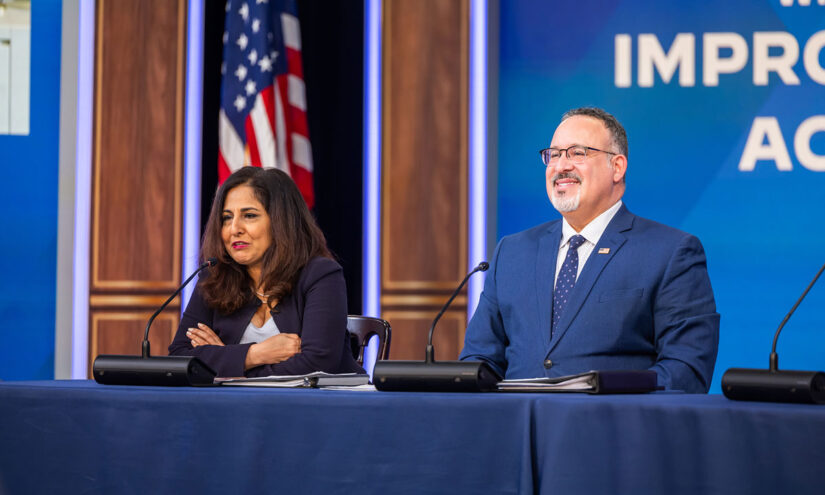During this summer, a team of students from MIT embarked on a journey to the sou …
Experts Praise Biden’s Student Achievement Agenda, But What About Parents?
Emma Wordsmith

The Biden administration received praise for prioritizing key strategies to assist students in recovering from the learning loss caused by the pandemic. These strategies include addressing chronic absenteeism, providing high-impact tutoring, and extending learning opportunities through afterschool and summer programs.
Speaking at a White House event to outline the president’s K-12 agenda, U.S. Education Secretary Miguel Cardona emphasized that these three strategies share a common goal of giving students the necessary time and support to succeed. Cardona stated, “We will utilize all available tools to advance these three pillars.”
During the event, which featured three governors and three state chiefs, successful efforts to allocate pandemic relief funds were highlighted. Examples included the implementation of home visits in Connecticut to improve student attendance and the New Jersey Tutoring Corps, which is now active in 245 out of the state’s 600 districts. The Biden administration aims to encourage more states and districts to adopt effective programs.
Despite the positive response, some critics argue that family involvement in these efforts has not been adequately addressed. Nat Malkus, a senior fellow at the conservative American Enterprise Institute, commented that “far too many families seem unconvinced that they need to send students to school regularly, or to engage in additional learning opportunities.” He believes that offering extra opportunities for learning won’t make a difference if parents don’t see the value.
Studies have shown a disconnect between parents and educators regarding the impact of school closures on learning loss. For instance, a December study from the University of Southern California identified an “urgency gap” between parents and educators, with parents expressing little concern about the long-term effects of school closures.
Keri Rodrigues, president of the National Parents Union, suggests that there are other reasons why students aren’t attending school regularly or taking advantage of tutoring opportunities. She believes that schools need to provide students with more compelling reasons to be present, citing instances of students watching movies or listening to book readings on YouTube during class. Rodrigues also highlights studies conducted after the pandemic indicating that schools are requiring less effort from students, leading to grade inflation.
An analysis of federal data shows that approximately 14 million students were chronically absent during the 2021-22 school year, with notable increases among Latino students and those in suburban and rural districts. The Biden administration aims to reverse these trends by promoting regular tracking of chronic absenteeism and encouraging states to incorporate it as an indicator in their state accountability plans.
The Department of Education plans to utilize the existing accountability structure under the federal Every Student Succeeds Act to support research-based tutoring programs. Research suggests that models connecting students with the same tutor at least three times a week show promising results. The department intends to monitor states’ implementation of tutoring programs and encourage the use of high-dosage models in low-performing schools. Additionally, the White House urges states to allocate resources to districts where test scores still lag behind pre-COVID levels.
However, concerns have been raised about the effectiveness and evidence-based nature of some online tutoring programs. Kevin Huffman, CEO of Accelerate, suggests that states may have signed contracts for large-scale online homework help that lack evidence to support their efficacy.
Phillip Lovell, associate executive director at All4Ed, views Biden’s agenda as a shift towards ensuring that successful programs reach students in the lowest-performing schools. While states have the opportunity to apply for an extension of pandemic aid, Lovell believes that the academic recovery process will take longer than the available funds. The exact funding for various programs, including tutoring, afterschool programs, and teacher coaching, is subject to congressional agreement on the budget for the current fiscal year.
In terms of enforcement and accountability, the administration has not provided specific details about additional tools to ensure evidence-based program implementation. Some state leaders express a desire for the Department of Education to play a more significant role in holding districts accountable. New Mexico Governor Michelle Lujan Grisham laments that many districts in her state are not offering extended learning programs or high-dosage tutoring, stating that it has been challenging to align everyone’s efforts towards improved outcomes for New Mexico students.


